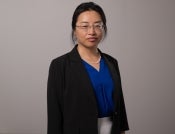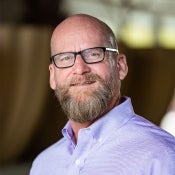ASU awarded prestigious $5.8 million NIH Roybal Center

ASU’s Edson College of Nursing and Health Innovation received a $5.8 million grant from the National Institute on Aging to create an Edward R. Roybal Center. ASU photo
Living alone is a lesser-known risk factor for Alzheimer’s and other types of cognitive decline. With an estimated 14 million Americans aging solo — by choice or circumstance — Arizona State University has a plan to help and new funding to support it.
This summer, ASU’s Edson College of Nursing and Health Innovation received a $5.8 million grant from the National Institute on Aging (NIA), part of the National Institutes of Health (NIH), to create an Edward R. Roybal Center to confront the issue.
Only about 15 U.S. universities and institutes are awarded a Roybal Center. “This is a huge honor,” said Fang Yu, the Edson College Chair in Dementia Translational Nursing Science and a professor at the college.
The ASU Roybal Center for Older Adults Living Alone with Cognitive Decline will build research infrastructure and advance clinical trials to develop and adapt technology-enabled lifestyle and behavioral interventions. The end goal is to create practical solutions to support older adults in maintaining their independence while managing the challenges of cognitive change.
“Everyone is different; you have different characteristics, behaviors, beliefs and perspectives about aging and Alzheimer’s disease, so what we are hoping to do is help people age the way they want to age,” Yu said.
Yu is the principal investigator and center director of ASU Roybal, which may present a first. To the Edson College's understanding, Yu is the first nurse scientist to be the sole PI of a Roybal Center, which is significant.
“Nurses have been increasingly playing major roles in national and international initiatives due to their training and experience. Being a nurse has allowed me to solve problems from a holistic perspective. I’m privileged to have the trust of my colleagues and NIA to lead ASU Roybal,” she said.
And she isn’t the only nurse involved. Her colleague and fellow nurse, Edson College Assistant Professor Abigail Gómez-Morales, will run one of the new center’s first clinical trials. The trial aims to encourage older adults living alone with cognitive decline to clarify their care preferences and plan for the future.
They are joined by David W. Coon, associate dean, professor, director of ASU's Center for Innovation in Healthy and Resilient Aging (CIHRA) and co-director of ASU Roybal. Coon helped secure the award for this highly competitive center due in part to his efforts over the years to establish CIHRA at Edson College and recruit faculty expertise in aging, social and behavioral interventions, and technology.
“ASU’s investment in additional researchers with aging expertise has positioned us as an ideal place to establish a Roybal Center that will identify and quickly translate evidence-based interventions for people who are often isolated in our communities, living alone and struggling with memory problems,” Coon said.
Rounding out the team is Professor Ross Andel, lead of ASU Roybal administrative core; Grace Center Professor for Innovation in Clinical Education, Simulation Science and Immersive Technology Thomas Parsons, co-lead of ASU Roybal behavioral intervention development core; and Associate Professor Molly Maxfield.
Maxfield, a fellow in CIHRA, will also run one of the first clinical trials in the new center. Her trial examines increasing physical activity through social support and stress resilience in older adults living alone with subjective cognitive decline.
“CIHRA and the new ASU Roybal Center are aligned in their missions to maximize quality of life for people as they age. Between the two centers and ASU’s growing number of experts in aging, I’m confident this will yield even more research projects as well as training programs for students, postdoctoral fellows and professionals interested in aging-related issues,” Coon said.
When it comes to recruiting for the studies, Yu says they plan to seek national and international participants to reach a significantly diverse group of older adults open to improving their day-to-day lives.
“We’re hoping to engage the conversation that this is your health; your life is in your hands. Participating in research will help develop a wealth of resources and tools you can pick from to better your life,” Yu said.
An official kickoff for the center is set for early 2025, but this initiative is not just about scientific breakthroughs — it’s about giving millions of Americans the resources to take charge of their cognitive health so they can age how and where they want for as long as possible.
More Health and medicine

Reducing waste in medical settings
Health care saves lives, but at what cost? Current health care practices might be creating a large carbon footprint, according to ASU Online student Dr. Michele Domico, who says a healthier…

ASU offers bilingual counseling to Spanish speakers
Arizona is one of the five states in the nation with the highest percentage of Hispanic residents, according to the U.S. Department of Health and Human Services Office of Minority Health, and …

College of Health Solutions launches first-of-its-kind diagnostics industry partnership to train the workforce of tomorrow
From 2007 to 2022, cytotechnology certification examinees diminished from 246 to 109 per year. With only 19 programs in the United States, the cytology workforce that stands at the front line of…



